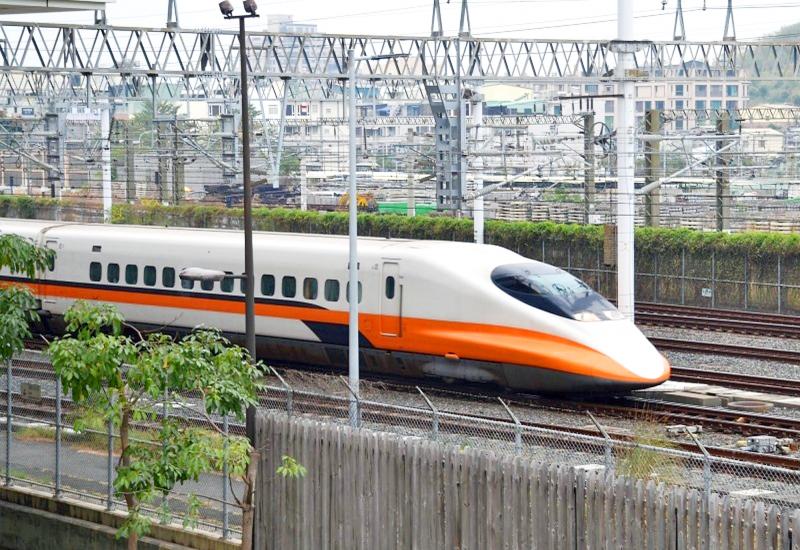Taiwan High Speed Rail Corp (THSRC, 台灣高鐵) is expected to recover quickly from the effects of COVID-19, as life returns to normal and thanks to the government’s domestic travel incentives, Yuanta Securities Investment Consulting Co (元大投顧) said in a note on Friday.
THSRC’s business might have bottomed out after revenue fell 49.83 percent year-on-year to NT$2.03 billion (US$67.59 million) in April, the lowest in nearly 10 years, while combined revenue in the first four months dropped 26.44 percent to NT$11.63 billion, as the COVID-19 outbreak reduced ridership, the investment consultancy said.
“The worst should be over in April as domestic tourism has started to resume in May after a half month without local coronavirus cases and THSRC carried out a promotion plan for students from May 27 and will provide more plans for all types of groups such as commuters,” Yuanta analyst Elle Yang (楊郁容) said in the note.

Photo: Wu Cheng-fung, Taipei Times
THSRC on Friday said that it is to provide six extra services per week from today and add 33 extra services during weekends from Friday next week to meet increased demand due to the government’s incentive programs for domestic tourism as the coronavirus situation stabilizes, the company’s Web site says.
“The ‘disease prevention tourism’ policy to be launched by the government by providing subsidies for tourism accommodation on July 1 should stimulate the domestic tourism industry and also increase demand for THSRC,” Yang said.
As people reduced their use of public transportation for tourist and business trips amid the COVID-19 outbreak, THSRC’s daily average ridership fell 17.2 percent year-on-year to 151,000 people in the first quarter, while its passenger load factor dropped to 53.7 percent, compared with 67.5 percent a year earlier, a company document released after an investors’ conference on Thursday showed.
As a result, the high-speed railway operator reported that net income decreased 50.63 percent year-on-year to NT$1.13 billion in the first quarter, with earnings per share of NT$0.2, the lowest in three years, company data showed.
Yang said that the company’s ridership and load factor recovered gradually last month.
Its sales are expected to decline year-on-year this month and the next, narrowing notably in July after promotion plans are offered, she said.
While border restrictions might continue, they would have little effect on operations, as foreign tourists constitute less than 10 percent of THSRC’s ridership, she added.

TAKING STOCK: A Taiwanese cookware firm in Vietnam urged customers to assess inventory or place orders early so shipments can reach the US while tariffs are paused Taiwanese businesses in Vietnam are exploring alternatives after the White House imposed a 46 percent import duty on Vietnamese goods, following US President Donald Trump’s announcement of “reciprocal” tariffs on the US’ trading partners. Lo Shih-liang (羅世良), chairman of Brico Industry Co (裕茂工業), a Taiwanese company that manufactures cast iron cookware and stove components in Vietnam, said that more than 40 percent of his business was tied to the US market, describing the constant US policy shifts as an emotional roller coaster. “I work during the day and stay up all night watching the news. I’ve been following US news until 3am

UNCERTAINTY: Innolux activated a stringent supply chain management mechanism, as it did during the COVID-19 pandemic, to ensure optimal inventory levels for customers Flat-panel display makers AUO Corp (友達) and Innolux Corp (群創) yesterday said that about 12 to 20 percent of their display business is at risk of potential US tariffs and that they would relocate production or shipment destinations to mitigate the levies’ effects. US tariffs would have a direct impact of US$200 million on AUO’s revenue, company chairman Paul Peng (彭雙浪) told reporters on the sidelines of the Touch Taiwan trade show in Taipei yesterday. That would make up about 12 percent of the company’s overall revenue. To cope with the tariff uncertainty, AUO plans to allocate its production to manufacturing facilities in

Six years ago, LVMH’s billionaire CEO Bernard Arnault and US President Donald Trump cut the blue ribbon on a factory in rural Texas that would make designer handbags for Louis Vuitton, one of the world’s best-known luxury brands. However, since the high-profile opening, the factory has faced a host of problems limiting production, 11 former Louis Vuitton employees said. The site has consistently ranked among the worst-performing for Louis Vuitton globally, “significantly” underperforming other facilities, said three former Louis Vuitton workers and a senior industry source, who cited internal rankings shared with staff. The plant’s problems — which have not

COLLABORATION: Given Taiwan’s key position in global supply chains, the US firm is discussing strategies with local partners and clients to deal with global uncertainties Advanced Micro Devices Inc (AMD) yesterday said it is meeting with local ecosystem partners, including Taiwan Semiconductor Manufacturing Co (TSMC, 台積電), to discuss strategies, including long-term manufacturing, to navigate uncertainties such as US tariffs, as Taiwan occupies an important position in global supply chains. AMD chief executive officer Lisa Su (蘇姿丰) told reporters that Taiwan is an important part of the chip designer’s ecosystem and she is discussing with partners and customers in Taiwan to forge strong collaborations on different areas during this critical period. AMD has just become the first artificial-intelligence (AI) server chip customer of TSMC to utilize its advanced